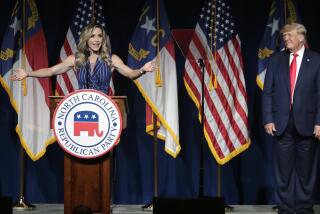PERSPECTIVE ON THE SOVIET UNION : Is the Party Over? Rival Gains Strength : A newly hatched reform movement shows signs of being strong enough to replace the Communists it doesn’t convert.
It is one thing to accept party competition in principle and another to establish a viable multiparty or two-party system. That has become clear in more than one country making the transition from communism to political pluralism. It has been especially evident in the Soviet Union.
Numerous small parties have been formed in the Russian Republic, some of which have split already, since they have attracted more aspiring chiefs than Indians. But until now the biggest names in the new Soviet politics have remained somewhat aloof from the new parties.
This is partly because some of them are, or until recently were, members of the Soviet Communist Party. The diversity of views within the ranks of that party, as well as personal rivalries, produced political struggles in the past, but this was a closed politics--or crypto-politics. Such a conglomeration of groupings, ranging from Marxist-Leninist fundamentalists to closet capitalists, has become an ever greater anachronism as the Soviet system has become more open and increasingly pluralist.
The time, in other words, is ripe for a major new political party to emerge that can draw members away from the catchall Communist Party and became a serious rival political organization, one that would, in all probability, supplant the Communist Party as the major political force in the country.
The first step toward the creation of such a party was taken last week. Nine leading figures in Soviet public life published an appeal that invited all Soviet citizens who care for democracy, individual freedom and the future of their state to unite in a “Movement for Democratic Reform.” This is likely to lead to formation of a major political party when the movement holds its founding Congress in September.
In a spirited article in the July 3 Izvestia, Alexander Yakovlev outlined some of the thinking behind this new initiative. He pointed out that the Russian Communist Party (headed by Ivan Polozkov) has “every single day” opposed the course that the Soviet Union’s leadership has now in principle adopted--that of marketization and further democratization.
And that was not all. Yakovlev spelled out the fate that might be in store for Russia’s radical reformers if they do not consolidate their strength through political organization. It was not only possible but even “highly likely” that “the forces of right-wing extremism and reaction” would attempt to eliminate not only the ideas behind the transformations but also their initiators. In the worst case, “millions of people who put their trust in the possibility of changing life for the better could find themselves abandoned to be torn to pieces by forces whose moral shape is familiar from the past.”
While Mikhail Gorbachev and Boris Yeltsin were not among the nine signatories who launched the “Movement for Democratic Reform,” they were represented by people close to them. Since Gorbachev is still general secretary of the Soviet Communist Party as well as president of the Soviet Union, he could not have been an explicit member of this embryonic party. And Yeltsin, as the elected president of Russia, has voiced his opinion that a head of state should be above party. Gorbachev has, however, welcomed the new development, while at the same time launching an attack on conservative elements within the Soviet Communist Party in an attempt to drive out of influential positions those who will not embrace the market and democratic institutions. If he were to succeed--which is rather unlikely--he would find himself leading what was in effect a Social Democratic party, one whose political profile was not radically different from the party to be launched by the Movement for Democratic Reform.
A Central Committee meeting of the Soviet party to be held July 25 will provide the latest opportunity for a showdown within the leading ranks of the Soviet Communists.
A majority of those at the plenum will be people who are deeply unhappy with the political course Gorbachev is pursuing, but whether they will be prepared to attempt to remove him from the party leadership remains doubtful.
While it is true that Gorbachev’s domestic popularity has greatly declined over the past two years, it still remains vastly in excess of the party apparatchiks’ popularity, and they must know that without him their electoral defeat would be certain. To abandon Gorbachev would be tanta- mount to a decision to fight by means other than democratic ones and to open up the possibility of their being called to legal as well as political account if they lost.
Soviet politics has become a turbulent sea in which Gorbachev’s ability to stay afloat in the face of waves of nationalism and whirlpools of discontent has been one of the miracles of our time. Whether he and the more overtly radical politicians who are now attempting to found a new party will go under is likely to be determined within the coming months.
The latters’ initiative is a hopeful development, not least because it is backed by allies of both Yeltsin and Gorbachev. The key political figures favoring the market and democracy must at least establish a measure of mutual trust or, better still, combine their strengths in order to promote these vital goals expeditiously, yet peacefully.
The alternative could be the violent reaction of which Yakovlev has warned.
More to Read
Sign up for Essential California
The most important California stories and recommendations in your inbox every morning.
You may occasionally receive promotional content from the Los Angeles Times.










